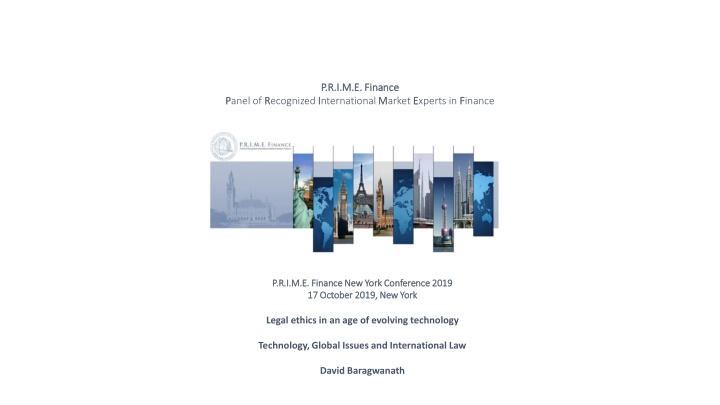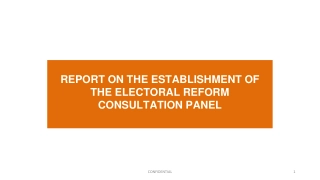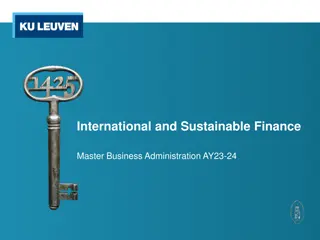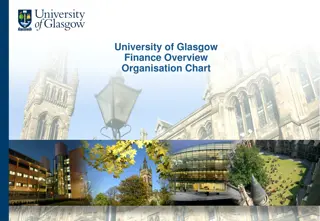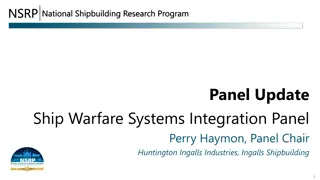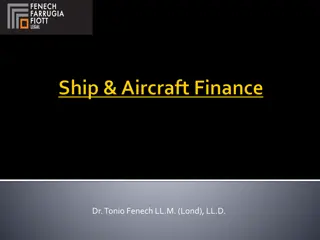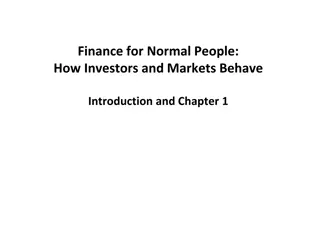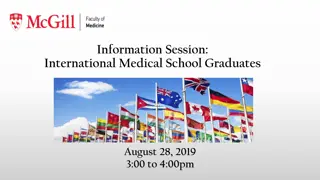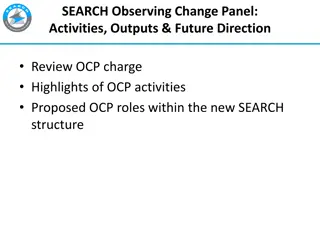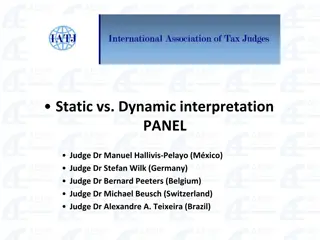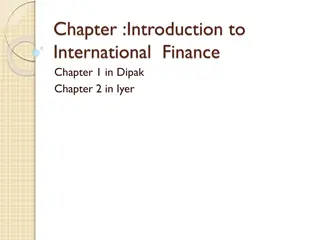P.R.I.M.E. Finance P.R.I.M.E. Finance P Panel of R Recognized I International M Market E Experts in F Finance
Delves into the ethical obligations faced by professionals in the legal field, particularly in light of advancing technologies and changing international norms. It explores the intersection of law, ethics, and compliance, emphasizing the importance of maintaining competence and addressing ethical challenges in today's digital age. The article also highlights key points raised by President Yusuf of the International Court of Justice regarding ethical challenges in international law, such as serving human society, common concerns of humanity, and grappling with technological impacts on human rights and freedoms.
Download Presentation

Please find below an Image/Link to download the presentation.
The content on the website is provided AS IS for your information and personal use only. It may not be sold, licensed, or shared on other websites without obtaining consent from the author.If you encounter any issues during the download, it is possible that the publisher has removed the file from their server.
You are allowed to download the files provided on this website for personal or commercial use, subject to the condition that they are used lawfully. All files are the property of their respective owners.
The content on the website is provided AS IS for your information and personal use only. It may not be sold, licensed, or shared on other websites without obtaining consent from the author.
E N D
Presentation Transcript
P.R.I.M.E. Finance P.R.I.M.E. Finance P Panel of R Recognized I International M Market E Experts in F Finance P.R.I.M.E. Finance New York Conference 2019 P.R.I.M.E. Finance New York Conference 2019 17 October 2019, New York 17 October 2019, New York Legal ethics in an age of evolving technology Technology, Global Issues and International Law David Baragwanath
A fundamental legal ethical obligation: to help create and to comply with good law Ethical obligations for lawyers, judges, arbitration as to evolving international norms Tools and Weapons: The Promise and the Peril of the Digital Age1, Brad Smith demand for stricter international rules over emerging forms of artificial intelligence2. Christchurch New Zealand massacre as an inflection point, called by the New York Times: an internet-native mass shooting, conceived and produced entirely within the irony- soaked discourse of modern extremism3. 1 (PenguinRandomHouse 2019) 2 Robin Panamenta The Telegraph 21 September 2019 3 Tools and Weapons p99 2
Ethic = a set of moral principles Ethics = those moral principles. Law and compliance with it are each an expression of ethics. Professor Golden initiated in the ABA s Model Rules of Professional Conduct the comment to Model Rule 1.1 Competence: "To maintain the requisite knowledge and skill, a lawyer should keep abreast of changes in the law and its practice, including the benefits and risks associated with relevant technology, engage in continuing study and education and comply with all continuing legal education requirements to which the lawyer is subject. (emphasis added) 3
On 2 September 2019 President Yusuf of the International Court of Justice, at the Second World Meeting of Societies for International Law, identified three fundamental ethical challenges for international law: 4
1) its capacity to serve human society. 2) its actual application to matters of common concern to humanity and to the commons. We have declared biological diversity to be of common concern to humanity, and we see it gradually disappearing before our eyes. We have declared climate change and the rising of the oceans a common concern of humanity, but we are struggling to have the law properly applied and extended to them. This is an area in which we need innovative and daring proposals and solutions by international lawyers. We no longer have the luxury of waiting to see how the practice of States evolves in these areas. We need avant-garde legal action 3) its ability to grapple with the impact of rapid technological advances on human rights and freedoms. Today, individual freedoms, individuality and independent thinking are at risk of being affected or even manipulated by technological tools in the hands of few major corporations in the most stealthy and Orwellian manner. Legal defenses need to be built against abusive behaviour arising from the use of such technologies. 5
We address the global dimension of legal ethics and technology under four headings: learning; educating; adapting and responding; Learning Decision-maker must properly understand the new systems. Brad Smith: lethal autonomous weapon systems with a significant degree of autonomy in the critical functions of selecting and attacking targets. Flying, swimming or walking drones can be equipped with lethal systems missiles, bombs or guns which could be programmed to operate partially or entirely autonomously and ultimately will spread to many countries. Unclear who is responsible for deaths or injuries caused by a machine the developer, manufacturer, commander or the device itself.4 4 https://www.telegraph.co.uk/technology/2019/09/21/microsoft-chief-brad-smith-says-rise-killer-robots- unstoppable/ 6
Kirin-Amgen Inc v Hoechst Marion Roussel Ltd [2004] UKHL 46, [2005] 1 All ER 667, 703 para 135 (HL) per Lord Hope: The work Professor Yudkin did by means of these carefully prepared seminars enabled all those involved to concentrate on the issues of law involved in the appeal without having to spend a good deal of extra time in the course of the hearing on learning about the technology. This had the result of shortening the length of the hearing by several days. there was no dispute about the technology. I suggest that it is a course which might usefully be adopted in the future in cases of this kind, where the technology is complex and the parties are willing to consent to it. 7
What do we mean by the term international law? In 2014 the Court of Appeal of England and Wales: 115 a fundamental change has occurred within public international law. The traditional view of public international law as a system of law merely regulating the conduct of states among themselves on the international plane has long been discarded. In its place has emerged a system which includes the regulation of human rights by international law, a system of which individuals are rightly considered to be subjects. (Belhaj v Straw [2014] EWCA Civ 1394, [2015] 2 WLR 1105, appeal dismissed [2017] UKSC 3, [2017] AC 964) 8
Yet in 2017 Oxfords best-selling legal text bore the title Is International Law International? A reporter for the Restatement (Fourth) of the Foreign Law of the United States, Professor Anthea Roberts showed that some in the US use public international law to mean what in other States is known as foreign law , rather than the international law just described in Belhaj. We are talking past one another instead of concentrating together on the problems and solutions. Professor Harold Hongju Koh offers another term. He speaks of transnational law the hybrid law that combines domestic and international, public and private law . (The Trump Administration and International Law (Oxford 2019) 7) 9
As to the creation of public international law, Justice Bryer in The Court and the World: American Law and the New Global Realities (Alfred A. Knopf New York 2015 pp281-4), has recognized that: the Supreme Court must increasingly consider the world beyond our national frontiers. In its growing interdependence, this world of laws offers new opportunities for the exchange of ideas, together with a host of new challenges that bear upon our job of interpreting statutes and treaties and even our Constitution new realities give rise to legal questions affecting not just foreigners but Americans as well. There is no Supreme Court of the World to answer these questions for us [T]he world will follow someone s example if not ours It is the need to maintain a rule of law that should spur us on, jurists and citizens, at home and abroad, to understand these challenges and to work at meeting them together. Dr. Daniel Peat Comparative Reasoning in International Courts and Tribunals (Cambridge 2019) 10
An even more fundamental topic - Is International Law Law? The leading text Oppenheim's International Law5 states as an established rule of English domestic law William Blackstone s assertion that the law of nations is part of the law of England . 5 (9th edition): Volume 1 Peace. Ed. Sir Robert Jennings QC, Sir Arthur Watts KCMG QC (Oxford)para 19(1)) 11
Yet in 2015 a seven member panel of the UK Supreme Court stated, to the contrary: a domestic decision-maker exercising a general discretion (i) is neither bound to have regard to this country's purely international obligations nor bound to give effect to them, but (ii) may have regard to the United Kingdom's international obligations, if he or she decides this to be appropriate.6 (emphasis added) I leave to those learned in US law the position in this country. 6R (Wang Yam) v Central Criminal Court [2015] UKSC 76, [2016] AC 771 12
Educating Need to break out of the narrow mindsets and vocabulary of their specialism and to communicate with members of the community affected by economic considerations in terms they can understand. Vulgariser n est pas vulgaire .7 First, law must learn to evolve to deal with novel techniques. Second, law and its use must be seen as the property of the people it governs. As in the Special Tribunal for Lebanon it may need to be complex. Hence, need to explain to the people what was being done in the name of international criminal law. Participants have described it as the most effective contribution to reconciliation in the State following its civil war. 7 J zabel Couppey- Soubeyran Le Monde 18-19 August 2019 p27 13
Adapting Technology emerging and evolving at an ever-increasing rate. How are legal ethics to keep pace? National Phonograph Company, Limited v. Edison-Bell Consolidated Phonograph Company, Limited, (1880) 6 Q.B.D. 244. A recent aviation systems failure, said to have much to do with what is euphemistically called the culture of [a] particular facility within Rolls-Royce s immense engineering establishment and coming close to catastrophic disaster in the airspace of Singapore and Indonesia of a Qantas Airbus superjumbo aircraft with 469 people on board, is graphically described in Simon Winchester s How Precision Engineers Created the Modern World.8 Need for law and practice of systems safety to keep pace with modern technology recognized by the International Civil Aviation Organization.9 8 (William Collins 2018) 173. 9 ICAO Circular 247-AN/148 Human Factors Digest No 10 Human factors, management and organisation 14
Cyber warfare, Peter Margulies essay Sovereignty and cyberattacks: technology s challenge to the law of State responsibility (2013) 14 Melbourne Journal of International Law 1-24. Thesis that cyber threats pose fresh challenges to sovereignty and to international law. In addressing kinetic attacks international law defines state responsibility narrowly. 15
So if in peacetime10Guy Gibson had stayed in England and manipulated electronic controls to open the gates of the M hne, Edersee and Sorpe dams in the Ruhr, with the same results as the bouncing bombs dropped from his Lancaster bombers, what would the law have said? 10 So the law of war and peace, alias International Humanitarian Law, provides no answer 16
Responding No novelty about the need for law to respond to challenges of new technology. They are the raison d tre of every kind of intellectual property. But the decision-maker must characterize it, either by deciding what existing principles should apply or by adapting those principles to bring them up to date. 17
Roberts CJ in Carpenter v United States 585 US (2018) (22 June). The Chief Justice held for the majority: the rule the Court adopts must take account of more sophisticated systems that are already in use or in development In mechanically applying the third-party doctrine to this case the Government fails to appreciate the lack of comparable limitations on the revealing nature of [the new technology] . 18
A New York Times report of August 2811 recorded a secret cyberattack against Iran on 20 June which wiped out a critical database used by Iran s paramilitary to plot attacks against oil tankers in the Persian Gulf. Said to have provided in response to a drone attack a proportionate measure calibrated to stay well below the threshold of war. Opposing arguments on the point.12 11 https://www.nytimes.com/2019/08/28/us/politics/us-iran-cyber-attack.html 12 New York Times report of September 2 2019 https://www.ejiltalk.org/did-the-us-stay-well-below- the-thrshold-of-war-with-its-june-cyberattack-on-iran/ 19
In New Zealand a recent major class action decision against company board members, who include a former New Zealand Prime Minister.13 A report Always on Duty: The Future Board asserts the need for radical change in how directors operate:14 Boards have to be across a staggering array of complex and diverse issues. They also need to be responsive to ballooning stakeholder demands and expectations. New laws targeting directors personally, active regulators, and the rise of litigation funding are also adding to the load. However despite significant change in the operating environment, including disruption to many business models, boards are operating in much the same way they always have. 13 Mainzeal Property and Construction Limited (in liq) v Yan [2009] NZHC 255 (26 February 2019) by the New Zealand Institute of Directors and the law firm Minter Ellison 14 https://www.iod.org.nz/Portals/0/Publications/IoD%20Always%20on%20duty- %20the%20future%20board.pdf?ver=2019-09-05-162739-047 20
Its first theme: Shareholder primacy v stakeholder theory Today, the issue is not whether a company should account for stakeholder [as distinct from shareholder] interests but rather the extent to which it should. In the decade since the Global Financial crisis corporate governance regimes around the world have been reformed and strengthened, swinging the pendulum away from shareholder primacy, and giving more recognition and weight to stakeholder interests.15 15 You will recall the statement statement endorsing [not just shareholder] but stakeholder capitalism, signed earlier this month by virtually all members of the US Business Roundtable, [which] has caused quite a stir , of which the Nobel laureate Joseph Stiglitz writing in The Guardian expressed both relief and a degree of scepticism, concluding: we need legislative reform so that corporations are not just allowed but actually required to consider the effects of their behaviour on other stakeholders : https://www.theguardian.com/business/2019/aug/29/can-we-trust-ceos-shock-conversion-to corporate-benevolence 21
It concludes: Technology has the potential to fundamentally change the way boards meet, breaking down global barriers with virtual reality, holoportation and instant voice translation. Technology should also help transform the way boards operate to ensure directors are more informed and equipped to monitor organisations and make decisions. Artificial intelligence in particular is expected to play a greater role in augmenting board decisions especially with real time data and analytics and this may lead to a revolution in reporting. 22
The ethical standards require sharp focus on social realities. Dr Willem Calkoen, in The One-Tier Board in the Changing and Converging World of Corporate Governance, contrasts societal differences borne out in Britain by R (on the application of Miller) v The Prime Minister between: reluctance to commit to rigid, unchangeable rules not all principles of governance necessarily need to be pinned down in formal laws and the US focus on the written constitution. In the vital, sensitive, and evolving field of military intelligence the Pentagon is seeking an ethicist to oversee it.16 16 The Guardian 7 September 2019 https://www.theguardian.com/us-news/2019/sep/07/pentagon- milit... 23
Conclusion President Yusuf described the need to: recognise the ephemeral nature of legal rules recognise that the rules exist only because and for the benefit of the society that they serve recognise that rules evolve, grow, fall into desuetude because of the changing needs of society. Most importantly, recognise that it is their job to identify, propose, and effect these changes in practice. 17 17 http://cassese-initiative.org/2017/09/fifth-antonio-cassese-lecture-the-role-of-international- lawyers-between-theory-and-practice/ 24
Modern technology contributes to yet can help mitigate the global warming which gives us a twelve year window to avoid permanently irretrievable damage to the environment. Need for the law to recognise ethic of global citizenship via innovative and daring proposals and solutions by international lawyers. It is not for a foreigner to enter the famous debate between Justices Scalia and Breyer as to the use of foreign law in the construction of a national constitution.18 But for a common law judge sitting with civil law judges in a final international court it is of the greatest assistance to be informed of relevant developments elsewhere. 18 Sin aRodin Constitutional Relevance of Foreign Court Decisions 64 The American Journal of International Law 815 (2016). 25
In an ever-shrinking world the need for developing international law. See essay in the latest part of the International and Comparative Law Quarterly19 which sees rapprochement between investment treaties and human rights treaties each expressing a value of profound international importance. 19 JH Fahner and M Happold The Human Rights Defence in International Investment Arbitration: Exploring the Limits of Systemic Integration ICLQ vol 68, July 2019 pp 741-759 26
